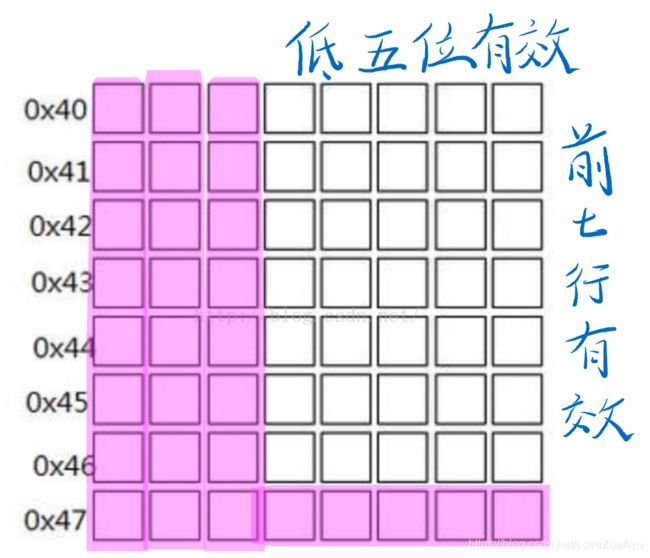LCD1602按照5x7点阵显示字符,可显示一些简单的汉字
!本博客是 《LCD1602自定义点阵字符》的学习笔记以及补(chao)充(xie)
LCD1602能存8个自定义字符, 首地址分别为0X40,0X48,0X50,0X58,0X60,0X68,0X70,0X78;
也就是说0x40到0x7F都是用来存自定义字符的
每个地址为一行(按字节寻址),但是每一行只有第五位有效,行也是前五行有效
存储和显示都是两步实现
一步write_command()确定地址
第二步write_data()确定操作数
write_command()和write_data()都是lcd1602经常写的函数,详见后面代码
要存储自定义字符需要两步
- 向lcd1602发送命令,定位行
- 写入每行对应的数据
比如将十储存到首地址为0x40
write_command(0x40); // line1
write_data(0x40);
write_command(0x40); // line2
write_data(0x40);
write_command(0x40); // line3
write_data(0x40);
write_command(0x40); // line4
write_data(0x40);
write_command(0x40); // line5
write_data(0x40);
write_command(0x40); // line6
write_data(0x40);
write_command(0x40); // line7
write_data(0x40);
显示自定义字符也是这个步骤
- write_command(0x80+[0x40第二行]+第几个字符);
- write_data(第几个自定义字符,也可以看ascii码表,前八个是自定义字符);
可以取模软件将自定义字符存到一个数组里面,然后两个函数用于修改和显示自定义字符
// custom_code is between on 0 and 7
void ch_custom_char(uchar *char_lattice, uchar custom_code)
{
int i;
for(i=0;i<8;i++)
{
write_command(0x40+custom_code*8+i); // set to the i-th line
write_data(char_lattice[i]); // write a line bit
}
}
void display_custom_char(uchar n, uchar custom_code)
{
write_command(0x80+n); // set to the n-th char
write_data(custom_code); // display the custom_code char
}
还可以将显示字符串的函数完善一下,将自定义字符串也自动识别显示。
我就懒得实现了。
下面是一个算是完整能用的代码
/* Main.c file generated by New Project wizard
*
* Created: 周四 5月 27 2021
* Processor: 80C31
* Compiler: Keil for 8051
*/
#include 参考博客:《LCD1602自定义点阵字符》

